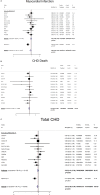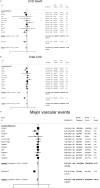Marine Omega-3 Supplementation and Cardiovascular Disease: An Updated Meta-Analysis of 13 Randomized Controlled Trials Involving 127 477 Participants
- PMID: 31567003
- PMCID: PMC6806028
- DOI: 10.1161/JAHA.119.013543
Marine Omega-3 Supplementation and Cardiovascular Disease: An Updated Meta-Analysis of 13 Randomized Controlled Trials Involving 127 477 Participants
Abstract
Background Whether marine omega-3 supplementation is associated with reduction in risk of cardiovascular disease (CVD) remains controversial. Methods and Results This meta-analysis included study-level data from 13 trials. The outcomes of interest included myocardial infarction, coronary heart disease (CHD) death, total CHD, total stroke, CVD death, total CVD, and major vascular events. The unadjusted rate ratios were calculated using a fixed-effect meta-analysis. A meta-regression was conducted to estimate the dose-response relationship between marine omega-3 dosage and risk of each prespecified outcome. During a mean treatment duration of 5.0 years, 3838 myocardial infarctions, 3008 CHD deaths, 8435 total CHD events, 2683 strokes, 5017 CVD deaths, 15 759 total CVD events, and 16 478 major vascular events were documented. In the analysis excluding REDUCE-IT (Reduction of Cardiovascular Events with Icosapent Ethyl-Intervention Trial), marine omega-3 supplementation was associated with significantly lower risk of myocardial infarction (rate ratio [RR] [95% CI]: 0.92 [0.86, 0.99]; P=0.020), CHD death (RR [95% CI]: 0.92 [0.86, 0.98]; P=0.014), total CHD (RR [95% CI]: 0.95 [0.91, 0.99]; P=0.008), CVD death (RR [95% CI]: 0.93 [0.88, 0.99]; P=0.013), and total CVD (RR [95% CI]: 0.97 [0.94, 0.99]; P=0.015). Inverse associations for all outcomes were strengthened after including REDUCE-IT while introducing statistically significant heterogeneity. Statistically significant linear dose-response relationships were found for total CVD and major vascular events in the analyses with and without including REDUCE-IT. Conclusions Marine omega-3 supplementation lowers risk for myocardial infarction, CHD death, total CHD, CVD death, and total CVD, even after exclusion of REDUCE-IT. Risk reductions appeared to be linearly related to marine omega-3 dose.
Keywords: cardiovascular diseases; fish oil; marine omega‐3 supplementation; meta‐analysis; randomized controlled trials.
Figures



Similar articles
-
Omega-3 fatty acids for the primary and secondary prevention of cardiovascular disease.Cochrane Database Syst Rev. 2018 Nov 30;11(11):CD003177. doi: 10.1002/14651858.CD003177.pub4. Cochrane Database Syst Rev. 2018. Update in: Cochrane Database Syst Rev. 2020 Feb 29;3:CD003177. doi: 10.1002/14651858.CD003177.pub5 PMID: 30521670 Free PMC article. Updated.
-
Omega-3 fatty acids for the primary and secondary prevention of cardiovascular disease.Cochrane Database Syst Rev. 2018 Jul 18;7(7):CD003177. doi: 10.1002/14651858.CD003177.pub3. Cochrane Database Syst Rev. 2018. Update in: Cochrane Database Syst Rev. 2018 Nov 30;11:CD003177. doi: 10.1002/14651858.CD003177.pub4 PMID: 30019766 Free PMC article. Updated. Review.
-
Associations of Omega-3 Fatty Acid Supplement Use With Cardiovascular Disease Risks: Meta-analysis of 10 Trials Involving 77 917 Individuals.JAMA Cardiol. 2018 Mar 1;3(3):225-234. doi: 10.1001/jamacardio.2017.5205. JAMA Cardiol. 2018. PMID: 29387889 Free PMC article.
-
Omega-3 Fatty Acids and Cardiovascular Disease: An Updated Systematic Review.Evid Rep Technol Assess (Full Rep). 2016 Aug;(223):1-1252. doi: 10.23970/AHRQEPCERTA223. Evid Rep Technol Assess (Full Rep). 2016. PMID: 30307737
-
Efficacy and Safety of Omega-3 Fatty Acids in the Prevention of Cardiovascular Disease: A Systematic Review and Meta-analysis.Cardiovasc Drugs Ther. 2024 Aug;38(4):799-817. doi: 10.1007/s10557-022-07379-z. Epub 2022 Sep 14. Cardiovasc Drugs Ther. 2024. PMID: 36103100 Review.
Cited by
-
Host Modulation and Treatment of Periodontal Disease.J Dent Res. 2021 Jul;100(8):798-809. doi: 10.1177/0022034521995157. Epub 2021 Mar 3. J Dent Res. 2021. PMID: 33655803 Free PMC article. Review.
-
Relationship between Polyunsaturated Fatty Acid Metabolism and Atherosclerosis.Rev Cardiovasc Med. 2024 Apr 9;25(4):142. doi: 10.31083/j.rcm2504142. eCollection 2024 Apr. Rev Cardiovasc Med. 2024. PMID: 39076540 Free PMC article. Review.
-
Chokeberry (A. melanocarpa (Michx.) Elliott)-A Natural Product for Metabolic Disorders?Nutrients. 2022 Jun 28;14(13):2688. doi: 10.3390/nu14132688. Nutrients. 2022. PMID: 35807867 Free PMC article. Review.
-
Omega-3 fatty acids, subclinical atherosclerosis, and cardiovascular events: Implications for primary prevention.Atherosclerosis. 2022 Jul;353:11-19. doi: 10.1016/j.atherosclerosis.2022.06.1018. Epub 2022 Jun 20. Atherosclerosis. 2022. PMID: 35759823 Free PMC article.
-
2023 Chinese guideline for lipid management.Front Pharmacol. 2023 Aug 29;14:1190934. doi: 10.3389/fphar.2023.1190934. eCollection 2023. Front Pharmacol. 2023. PMID: 37711173 Free PMC article. Review.
References
-
- Wang C, Harris WS, Chung M, Lichtenstein AH, Balk EM, Kupelnick B, Jordan HS, Lau J. n‐3 Fatty acids from fish or fish‐oil supplements, but not α‐linolenic acid, benefit cardiovascular disease outcomes in primary‐ and secondary‐prevention studies: a systematic review. Am J Clin Nutr. 2006;84:5–17. - PubMed
-
- Zheng J, Huang T, Yu Y, Hu X, Yang B, Li D. Fish consumption and CHD mortality: an updated meta‐analysis of seventeen cohort studies. Public Health Nutr. 2012;15:725–737. - PubMed
-
- Rizos EC, Ntzani EE, Bika E, Kostapanos MS, Elisaf MS. Association between omega‐3 fatty acid supplementation and risk of major cardiovascular disease events: a systematic review and meta‐analysis. JAMA. 2012;308:1024–1033. - PubMed
-
- Kwak SM, Myung SK, Lee YJ, Seo HG. Efficacy of omega‐3 fatty acid supplements (eicosapentaenoic acid and docosahexaenoic acid) in the secondary prevention of cardiovascular disease: a meta‐analysis of randomized, double‐blind, placebo‐controlled trials. Arch Intern Med. 2012;172:686–694. - PubMed
-
- Siscovick DS, Barringer TA, Fretts AM, Wu JHY, Lichtenstein AH, Costello RB, Kris‐Etherton PM, Jacobson TA, Engler MB, Alger HM, Appel LJ, Mozaffarian D. Omega‐3 polyunsaturated fatty acid (fish oil) supplementation and the prevention of clinical cardiovascular disease: a science advisory from the American Heart Association. Circulation. 2017;135:e867–e884. - PMC - PubMed
Publication types
MeSH terms
Substances
Grants and funding
LinkOut - more resources
Full Text Sources
Medical

